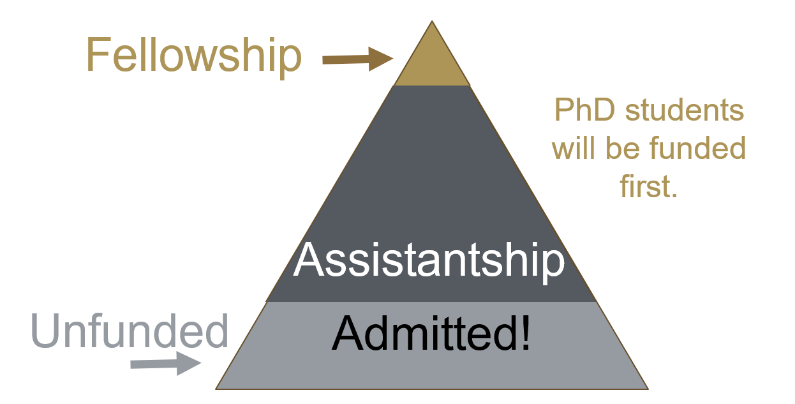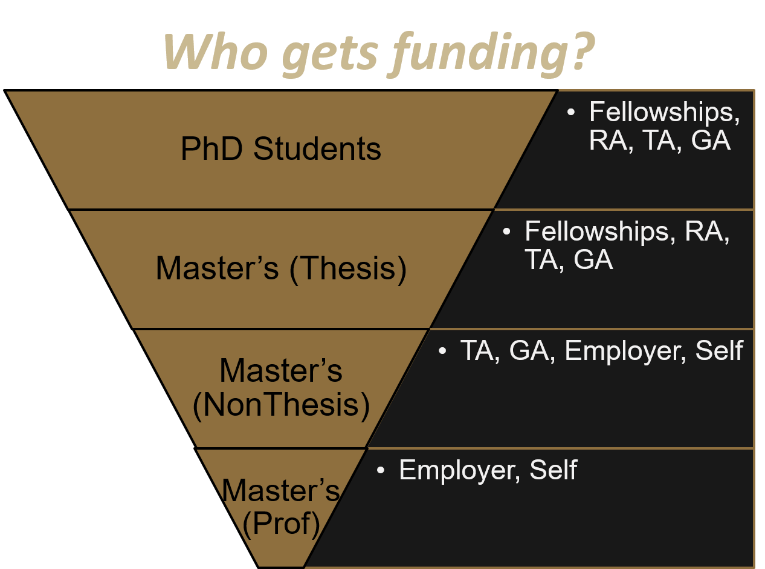You can get paid to go to Graduate School:
Assistantships and Fellowships
There are many resources that exist to support graduate students. Below are some insider tips regarding graduate school resources (stipend, health insurance, scholarships, fellowships, conferences, and expectations). Learn more about graduate school funding structures here:
What is a stipend? Money that is paid to students that support living expenses while you complete research and/or your classes.
Assistantships and Fellowships will typically pay your tuition (partial or full) and pay you a stipend (or paycheck).

You will generally be considered for some forms of internal university funding (assistantships and fellowships internal to the university) when you submit your application to graduate school. There are some prestigious fellowships that you can apply to separately, such as the National Science Foundation Graduate Research Fellowship (NSF GRFP), Ford Foundation Predoctoral Fellowships, GEM Fellowship, and other fellowships.
Who gets funding? Funding will go to students who are doing thesis or research-based degrees first, starting with PhD Students and then Master's Thesis students. These students are funded via internal and external fellowships and Assistantships (RA = Research Assistantship; TA = Teaching Assistantship; GA = Graduate Administrative Assistantship).

Students who are only taking classes and pursuing a non-thesis and or professional master's degree are at the bottom of the funding pyramid and will receive the least amount of funding from the university. There are a high percentage of students pursuing non-thesis and professional master?s degrees who self-pay, take out loans, and/or have their employer pay for their graduate degree.
If you are an indigenous student, then you should reach out to your tribal nation or group to inquire about any funding. Other awards also exist for indigenous students, including the Sloan Indigenous Graduate Partnership.
Check out additional resources on money management and other financial considerations.
Want your graduate degree paid for? Your highest chances of receiving funding is by pursuing a research-based degree!
What does funding look like throughout your graduate degree program?
Apply for conference travel to present your research! Often there are several opportunities to obtain funding for conference travel. Here are a few places to check and people to ask.
- Your department and your research mentor
- Your graduate student senate/government at your institution-many have travel (and sometimes research support available)
- Your Graduate College/School at your institution-many have travel (and sometimes research support available)
- The conference that you plan to attend-often they have student travel scholarships available. Be sure to check out the website and look for application deadlines and specifics on the process.
- Conference travel can also be funded by some student affinity groups on campus.
In most cases, you will have to compile support from multiple resources to fully support the travel so plan and be aware of deadlines and the time span for reimbursements. Talk to your advisor about their expectations for conference travel and funds.
It's also important to ask whether you will have to pay out of pocket up front and wait for reimbursement or if the funds are distributed as cash scholarship in advance, etc. Some universities have university travel credit cards that you can use so that you do not have to front any costs.
Dissertation completion grants and fellowships - Your University, NSF, and other agencies may offer funding opportunities to complete your PhD! Look for dissertation completion fellowships through your Graduate School and/or Discipline. Ask someone in your graduate program (department chair, graduate program director) early about what options are available on your campus. Many funding sources have specific deadlines during the year. Be sure to ask early about resources for you on your campus!
Mentorship
Ask whether your graduate program, academic college (e.g. College of Engineering), or the Graduate School has a peer mentoring programs for graduate students. This is where senior graduate students are paired with new graduate students. The peer mentor can serve as a resource for information and connection to university resources and can help you navigate your experience as a graduate student! Check out some more mentoring resources.
Mental Health and Wellbeing
The Graduate School Experience looks different for everyone
The combination of graduate student responsibilities will look different for every graduate student. Some typical responsibilities are included in the image below, and it is important to learn about the experiences of others so that you can better understand the hidden curriculum of Graduate School.
Consider reading: A Field Guide to Grad School: Uncovering the Hidden Curriculum (Skills for Scholars) - ask your program about purchasing a copy for students to borrow or check your institutions library for a copy. However, the digital and paper book copies are relatively inexpensive on amazon and will likely serve as a solid investment.

A couple of YouTube Presentations Related to the Book:
- Dr. Jessica Calarco, Princeton University - Field Guide to Graduate School Presentation
- A Field Guide to Graduate School: Uncovering the Hidden Curriculum Book Discussion
What it Imposter Syndrome and how to overcome it?
Imposter syndrome is when someone doubts their talents, skills, and abilities and feels like they are a fraud despite their education, experience, and accomplishments.
To keep your mental health in check, you will sometimes need to ask for help and/or reach out to your graduate school advocates. You come first, so make sure you get the help that you need!
The following can be considered helpful resources to your mental health and wellbeing:
It is important to get out of your comfort zone and look for social activities at your university and in the broader community (trivia, karaoke, running/hiking clubs, etc...). Learn more about how to build your community here.
Your University and Graduate School will have Mental Health resources specific for you. Below are a list of some national mental health resources:
Other Helpful Resources:
- Understand whether your graduate student stipend is compensatory (stipend in exchange for work) OR non-compensatory (no work): https://www.insidehighered.com/blogs/gradhacker/why-it-matters-how-you-are-paid (5 free articles per month)
- Need some more advice about personal finance for PhD students? Listen to the Financial Advice for Prospective PhD Students Podcast: https://pfforphds.libsyn.com/financial-advice-for-prospective-phd-students
- How to have a conversation and plan regarding expectations early on with your mentor(s): https://rackham.umich.edu/downloads/student-mentoring-handbook.pdf
- Building Successful Mentoring Relationships: https://www.gs.emory.edu/_includes/documents/sections/professional-development/mentoring-guide_student_final.pdf
